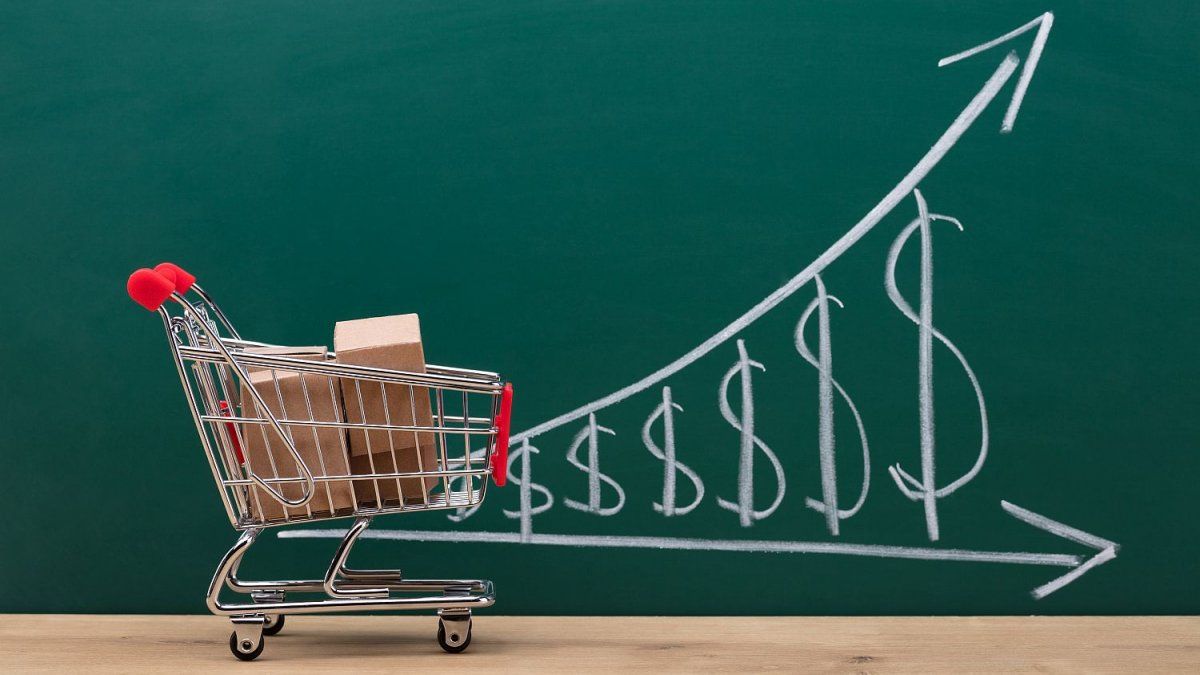- The December contract traded at $755 per dollar on Thursday.
- The January term closed at $875.
- As of February, the future dollar was quoted at $959.70.
- For March, the market agreed on a value of $1038 for the currency.
These values are far from those that were seen as soon as the Libertarian victory in the runoff was announced, when the January contract exceeded $900. Even so, they realize the expected devaluation by the market that, at the same time, discards a quick lifting of the stocks.
As for the blue dollar, the informal exchange rate rose $35 in the week prior to the inauguration and during the holiday, the Bitso crypto dollar that was taken as a reference sold above $1,000.
Thus, it accompanies the trend that alternative dollars showed on Thursday, with the blue at $990 after having touched $1,000. The MEP dollar and the cash dollar had also risen, ending at $986 and $991, respectively.
dollar-blue-inversiones-finanzas.jpg
The market expects an exchange rate adjustment for this Monday.
Depositphotos
There are strong indications that Milei will aim for a rapid rearrangement of different variables, including the price of the dollar, so another devaluation could occur.
“On Monday investors’ attention will be directed to the reading that has left the inaugural speech and the first economic measures that could have been announced, with focus on fiscal balance and the excess of pesos, although also in how the exchange rate regime would start in this new stage that is expected to be with fewer restrictions,” estimated economist Gustavo Ber.
He considered that “it will be crucial for the new administration to achieve quickly awaken confidence, since it is essential to achieve parliamentary and social support that allows progress in an implementation that without a doubt will have associated costs in the short term, among them an acceleration of inflation accompanied by a contraction in economic activity.”
Javier Milei’s first day: what can happen to stocks, bonds and country risk
On Friday, Argentine bonds in dollars that were listed on Wall Street showed increases of between 0.5 and 1.5%. The AL30, the most popular title on the market, advanced 0.4%, while the AL35 rose 1.5%.
So far this year these bonds have risen 54 and 30%, respectively. The AL30 is trading at US$37.15. The Most of the increase occurred in recent weeks, hand in hand with the imminence of the change of government that anticipates a new economic model.
It also helped the recovery of the titles that the president-elect, Javier Milei, has publicly said that Argentina will honor its debts, which moved away the ghost of a restructuring of liabilities.
For their part, the ADR, the Argentine stocks that were listed on Wall Street, were mixed, with increases of up to 3% for YPF and falls of 3.6% for Cresud. Taking this into account and the behavior that the market has been having in recent days, a positive reaction.
For Gonzalo Chiarullo, CEO of Invar, vice president and CEO of Numero Bursátil and associate director in charge of the Corporate Financing Department of Phronencial, when talking about the capital market you have to divide it in two. “In the first half there is the debt, both corporate and sovereign, and in the second half there are the shares of the listed companies”held.
Regarding debt, the analyst explained that the investor buys debt securities in exchange for a payment of a regular rate and at maturity receives the initial capital invested. “This dynamic, with its flats, is maintained throughout all types of investors. Argentine sovereign debt was for a long time at ridiculously low values, around 30% of the nominal value. That is, to recover their initial value they would have to more than triple. These values were achieved starting in 2019 and throughout the outgoing government,” he stressed.
chiarullo.jpg

But for Chiarullo, other challenges arise on the horizon. “The probability of default, the re-profiling of bonds and the inability of the state to cancel its assumed commitments are the main reasons for the disinterest of investors. A strategy of unrestricted commitment by the creditor’s assets and a very strict plan that ensures the capacity of the state of paying its debts is a signal that the investor market may arouse interest in sovereign debt bonds. Within this first half, corporate debt may also face incremental demand as a result of President Milei’s commitment to ‘get them off their backs’,” considered.
In the second half, in which the actions are found, we can expect dissimilar behaviors, according to the expert: “On the rise in mass consumption, energy, Oil & Gas and transportation, investment in the real economy, and agriculture mainly; Until it is clarified what the plan is with the Lelics, “lateralizing banks, and any listed company that depends on public works and closed markets to survive, should go through prolonged processes of decline in their price until they demonstrate the ability to compete with international markets.”
Inflation
After the 8.3% that marked the Consumer Price Index (CPI) October, the private sector discounts that inflation will return to double digits from December onwards, which means that the cost of living for the months to come will be higher.
For private companies, last month’s CPI, which will be known on the 13th of this month, will be between 11% and 13%. So, C&T Economic Advisors reported inflation of 11.5% in November. Meanwhile, the Freedom and Progress Foundation (L&P) recorded inflation of 12.6%, while Ecolatina reported 12.7%. For the Study Center Orlando Ferreresfor its part, scored 12.9%, EcoGo bet that it will be 13.4% and Balance projected 11.2%.
In this way, the consultants predict that the year will end with a inflation which will move in a range between 182% and 211%. However, there is a possibility that this figure could increase up to 240% in the event of a significant devaluation, as is expected to happen. That, as said, would have an almost immediate transfer to prices.
From Equilibra they advance that inflation during the presidency of Alberto Fernandez accumulated 916%, which gives a monthly average of almost 5%, above the second term of Cristina Fernández de Kirchner (2.2% monthly) and that of Mauricio Macri’s administration.
The expectation that inflation could rise to a floor of 20% in December (if they devalue the official dollar).
Prices: how will the adjustment be in rates, prepaid, transportation and services
The delay in the main relative prices of the economy during the Government of Alberto Fernández is one of the objectives that Javier Milei’s economic team has in mind. There you will find gasoline, electricity and gas rates, prepaid, transportation, among others. Private calculations warn that correcting these imbalances implies, in the first instance, doubling inflation in the short term.
A recent work by Equilibra detailed that to equate regulated prices with the general level, gasoline would have to increase 45.5%, energy rates 146.8%, public transportation 83.3% and prepaid rates 39.2%. With that cocktail, inflation would rise almost 7 points, according to Equilibra’s estimate.
“It is interesting to note from the fiscal point of view, that only the increase in energy rates and of public transport They would help lower public spending through less need for subsidies. The rise in prepaid prices would decompress the critical profitability situation of the sector, at the cost of higher costs for families who contract these services. Finally, in this exercise we only capture the direct impact of the gasoline increase on the CPI, and not the indirect one generated by the fuel impact more expensive on the logistics costs that significantly affect the production of goods and services of the economy and public transportation,” they clarified.
“Product of the high inflationary inertia, The shock would raise the monthly inflation rate several notches, and as this would remain high, the annual CPI would end up climbing much higher thanl estimated initial impact to correct the delay. After the adjustment of relative prices, a stabilization plan will be needed,” concluded Equilibra.
Increases in salary rates.jpg

Rates are more than 100% behind, according to a private report.
A report of Romano Groupbased on data from Indec, estimated that the “repressed inflation” accumulated from December 2019 to October 2023, the latest data available, is 33%.
The consulting firm detailed that of the major CPI items, those with the greatest delay in real terms, that is, discounting general inflation during the last almost four years, are: housing, water, electricity, gas and other fuels (38%), communication (37%), various goods and services (19%), education (18%), transport (10%), health (8%) and alcoholic beverages and tobacco (6 percent).
The chapters with the greatest real increase in the period were: clothing and footwear 36%, restaurants and hotels 25%, food and drinks 10%, recreation and culture 5% and home equipment and maintenance 4%.
Bye Pre-Trip, VAT refund, Fair Prices and “Now 12”
Pre-trip
Pre-trip it’s a tourist pre-sale program which reimburses 50% of the value of the travel expenses in credit. In addition, it included a special scheme for PAMI affiliates through which the return was 70%. In their five editionsthe program benefited 7.5 million peoplewith a economic impact of $792 billion for him tourism sector.
Throughout the campaign that established him as the winner of the electoral contest, the libertarian leader made it clear that one of his great objectives, in order to balance the country’s economy, was going to be reduce the deficit by cutting state spendingso your definition of clipping could also point to the removal of the Pre-trip Program. In fact, this proposal crystallized in the symbol of the chainsaw which he carried in many of the caravans he made throughout the country. The last edition of this program ended in October and it is most likely that Don’t have an issue again.
VAT refund
In December, the AFIP maintains the Buy without VAT refund program in force, which enables a 21% refund on debit card purchases. In view of the inauguration of Javier Milei as president of Argentina, concerns arise about how long the benefit will last. Holders of the IFE or Anses assignments, retirees, workers Employees and monotributistas will be able to access savings of $18,800 on Christmas and New Year purchases.
Buy without VAT is valid until December 31, Therefore, workers, monotributistas, AUH holders, pensioners and IFE will be able to access refunds of $18,800 as a monthly limit until the end of the year.
Fair Prices and “Now 12”
The Now 12 consumer financing program will come to an end with the new government. Members of Luis Caputo’s economic team revealed that both programs will not continue. At the moment, the expiration date is until January 31 and what was resolved is to maintain the plans of 3,6,18 and 24 installments for the Holidays.
Source: Ambito




